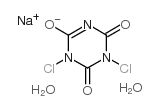| Structure | Name/CAS No. | Articles |
|---|---|---|
 |
Sodium Dichloroisocyanurate
CAS:2893-78-9 |
|
 |
Dichloroisocyanuric acid sodium salt dihydrate
CAS:51580-86-0 |